- Home
- P. D. James
Death Comes to Pemberley Page 11
Death Comes to Pemberley Read online
Page 11
After some minutes of blessed silence she gently freed herself and said, ‘My love, you have not eaten since dinner and you look exhausted. You must take some nourishment before what remains of the night. Mrs Reynolds has provided hot soup in the small dining room. The colonel and Charles are already there.’
But the comfort of a shared bed and Elizabeth’s loving arms were denied him. In the small dining room he found that Bingley and the colonel had already eaten and that the colonel was determined once again to take command.
He said, ‘I propose, Darcy, to spend the night in the library, which is close enough to the front door to provide some assurance that the house will be secure. I have taken the liberty of instructing Mrs Reynolds to provide pillows and some blankets. It is not necessary for you to join me if you need the greater comfort of your bed.’
Darcy thought the precaution of being near the locked and bolted front door was unnecessary, but he could not allow a guest to sleep in some discomfort while himself in bed. Feeling he had no choice, he said, ‘I cannot suppose that whoever killed Denny will be so audacious as to attack Pemberley, but I shall, of course, join you.’
Elizabeth said, ‘Mrs Bingley is sleeping on a couch in Mrs Wickham’s room, and Belton will be on call, as shall I. I will check that all is well there before retiring. I can only wish you gentlemen an uninterrupted night and I hope some hours of sleep. As Sir Selwyn Hardcastle will be here by nine, I shall order an early breakfast. For now I wish you goodnight.
2
Entering the library, Darcy saw that Stoughton and Mrs Reynolds had done their best to ensure that the colonel and he were made as comfortable as possible. The fire had been replenished, lumps of coal wrapped in paper for quietness and added logs lay ready in the grate, and there was a sufficiency of pillows and blankets. A covered dish of savoury tarts, carafes of wine and water and plates, glasses and napkins were on a round table some distance from the fire.
Privately Darcy thought a watch unnecessary. The main door to Pemberley was well secured with double locks and bolts and even if Denny had been murdered by a stranger, perhaps an army deserter who had been challenged and responded with deadly violence, the man would hardly present a physical threat to Pemberley House itself or anyone in it. He was both tired and restless, an uneasy state in which to sink into a deep sleep which, even were it possible, would seem like an abdication of responsibility. He was troubled by a premonition that some danger threatened Pemberley without being able to form any logical idea of what that danger could be. Dozing in one of the armchairs in the library with the colonel for company would probably give him as good a rest as he could expect for the remaining hours of the night.
As they settled themselves in the two high buttoned and well-padded chairs, the colonel taking the one by the fire and he a little distant, the thought occurred to him that his cousin might have suggested this vigil because he had something to confide. No one had questioned him about his ride just before nine and he knew that, like him, Elizabeth, Bingley and Jane must be expecting him to provide an explanation. Since it had not yet been forthcoming a certain delicacy prohibited any questions, but no such delicacy would inhibit Hardcastle when he returned; Fitzwilliam must know that he was the only member of the family and guests who had not yet put forward an alibi. Darcy had never for a moment considered that the colonel was in any way involved in Denny’s death, but his cousin’s silence was worrying and, what was more surprising in a man of such formal manners, it smacked of discourtesy.
To his surprise he felt himself falling into sleep much more quickly than he had expected, and it was an effort even to answer a few commonplace remarks which came to him as at a remote distance. There were brief moments of half-consciousness as he shifted in his chair and his mind took hold of where he was. He glanced briefly at the colonel stretched out in the chair, his handsome face ruddied by the fire, his breathing deep and regular, and watched for a moment the dying flames licking at a blackened log. He urged his stiffened limbs out of his chair and, with infinite care, added a few more logs and some lumps of coal and waited until they were alight. Then he returned to his chair, pulled a blanket over him and slept.
His next awakening was curious. It was a sudden and complete return to consciousness in which all his senses were so acutely alert that it was as if he had been expecting this moment. He was huddled on his side and it was through eyelids almost entirely closed that he saw the colonel moving in front of the fire, momentarily blocking out its glow which provided the only light in the room. Darcy wondered whether it was this change which had awakened him. He had no difficulty in feigning sleep, looking through almost closed eyes. The colonel’s jacket was hanging on the back of his chair, and now he fumbled for a pocket and pulled out an envelope. Still standing, he took out a document and spent some time in perusing it. Then all that Darcy could see was the colonel’s back, a sudden movement of his arm and a spurt of flame; the paper was being burnt. Darcy gave a little grunt and turned his face further from the fire. Normally he would have made it apparent to his cousin that he was awake and would have enquired if the colonel had managed to get some sleep, and the small deceit seemed ignoble. But the shock and horror of the moment when he had first seen Denny’s body, the disorientating moonlight, had struck him like a mental earthquake in which he no longer stood on firm ground and in which all the comfortable conventions and assumptions which since boyhood had ruled his life lay in rubble round him. Compared with that disruptive moment the colonel’s strange behaviour, his still unexplained ride into the night, and now the apparently surreptitious burning of some document, were small aftershocks but they were still disconcerting.
He had known his cousin since boyhood and the colonel had always seemed the most uncomplicated of men, the one least given to subterfuge or deceit. But there had been a change since he had become an elder son and the heir to an earl. What had become of that gallant, light-hearted young colonel, that easy and confident sociability so different from Darcy’s own sometimes paralysing shyness? He had seemed the most affable and popular of men. But even then he had been conscious of his family responsibilities, of what was expected of a younger son. He would never have married an Elizabeth Bennet, and Darcy occasionally felt that he had lost some respect in his cousin’s eyes because he had placed his desire for a woman above the responsibilities of family and class. Certainly Elizabeth seemed to have sensed some change, although she had never discussed the colonel with Darcy except to warn him that his cousin was about to seek a meeting to request Georgiana’s hand. Elizabeth had felt it right to prepare him for the meeting but it had not, of course, taken place, and now it never would; he had known from the moment when the drunken Wickham was almost carried through the door of Pemberley that the Viscount Hartlep would be looking elsewhere for his future countess. What surprised him now was not that the offer would never be made, but that he who had harboured such high ambitions for his sister was content that this offer at least was one she would never be tempted to accept.
It was not surprising that his cousin should feel oppressed by the weight of his coming responsibilities. Darcy thought of the great ancestral castle, the miles of pitheads above the black gold of his coalfields, the manor house in Warwickshire with its square miles of fertile earth, the possibility that the colonel, when he succeeded, might feel that he had to relinquish the career he loved and take his seat in the House of Lords. It was as if he were making a disciplined attempt to change the very core of his personality and Darcy wondered whether this was either possible or wise. Was he perhaps facing some private obligation or problem, different in kind from the responsibilities of inheritance? He thought again how strange it was that his cousin should have been so anxious to spend the night in the library. If he wanted to destroy a letter there were sufficient fires already lit in the house for him to seize a private moment, and why destroy it now and in such secrecy? Had something happened that made the destruction of the document imperative? Trying to make
himself comfortable enough for sleep, Darcy told himself that there were enough mysteries without adding to them, and eventually he slid again into unconsciousness.
He was awoken by the colonel noisily drawing the curtains then, after a glance, he pulled them back again, saying, ‘Hardly light yet. You slept well, I think.’
‘Not well, but adequately.’ Darcy reached for his watch.
‘What is the time?’
‘Just on seven.’
‘I think I ought to go and see if Wickham is awake. If so, he’ll need something to eat and drink and the watchers may need some food. We can’t relieve them, Hardcastle’s instructions were adamant, but I think someone should look into that room. If Wickham is awake and in the same state that Dr McFee described when he was first brought here, Brownrigg and Mason may have difficulty in restraining him.’
Darcy got up. ‘I’ll go. You ring for breakfast. It won’t be served in the dining room until eight.’
But the colonel was already at the door. He turned and said, ‘Better leave it to me. The less you have to do with Wickham the better. Hardcastle is on the alert for any interference on your part. He is in charge. You can’t afford to antagonise him.’
Privately Darcy admitted that the colonel was right. He was still determined to regard Wickham as a guest in his house, but it would have been foolish to ignore the reality. Wickham was the prime suspect in a murder inquiry and Hardcastle had the right to expect that Darcy would keep away from him, at least until Wickham had been interrogated.
The colonel had hardly left before Stoughton arrived with coffee, followed by a housemaid to attend to the fire accompanied by Mrs Reynolds to enquire whether they would like breakfast to be served. A log smouldering in the acrid ash crackled into life as fresh fuel was added, the leaping flames illuminating the corners of the library but emphasising the darkness of the autumnal morning. The day, which for Darcy presaged nothing but disaster, had begun.
The colonel returned within ten minutes as Mrs Reynolds was leaving, and went straight to the table to pour himself coffee. Settling again into the chair, he said, ‘Wickham is restless and muttering but still asleep and likely to remain so for some time. I’ll visit him again before nine and prepare him for Hardcastle’s arrival. Brownrigg and Mason have been well supplied with food and drink during the night. Brownrigg was dozing in his chair and Mason complained that his legs were stiff and he needed to exercise them. What he probably needed was to visit the water closet, that new-fangled apparatus you have had installed here which, I understand, has caused much ribald interest in the neighbourhood, so I gave him directions and waited on guard until he returned. As far as I can judge, Wickham will be sufficiently awake to be questioned by Hardcastle by nine. Do you intend to be present?’
‘Wickham is in my house and Denny was murdered on my property. It is obviously right that I should take no part in the investigation, which will of course be under the direction of the High Constable when Hardcastle reports to him; he is unlikely to take an active part. I’m afraid this is going to be an inconvenient business for you; Hardcastle will want an inquest as soon as possible. Luckily the coroner is at Lambton, so there shouldn’t be a delay in selecting the twenty-three members from which to provide the jury. They will be local men but I’m not sure that will be an advantage. It is well known that Wickham is not received at Pemberley and I have no doubt the gossips have been busy speculating why. Obviously both of us will be needed to give evidence, which I suppose will have to take precedence over your recall to duty.’
Colonel Fitzwilliam said, ‘Nothing can take precedence over that, but if the inquest is held soon, there should be no problem. Young Alveston is more fortuitously placed; he seems to have no difficulty in leaving what is said to be a very busy London career to enjoy the hospitality of Highmarten and Pemberley.’
Darcy didn’t reply. After a short silence, Colonel Fitzwilliam said, ‘What is your programme for today? I suppose the staff will need to be told what is happening and prepared for Hardcastle’s interrogation.’
‘I shall go now and see if Elizabeth is awake, as I think she will be, and together we will speak to all the staff. If Wickham is conscious, Lydia will be demanding to see him, and indeed that is her right; then, of course, we must all prepare ourselves to be questioned. It is opportune that we have alibis, so Hardcastle need not waste much time on anyone who was at Pemberley yesterday evening. He will no doubt enquire of you when you started on your ride and when you returned.’
The colonel said briefly, ‘I hope I shall be able to satisfy him.’
Darcy said, ‘When Mrs Reynolds comes back will you please inform her that I am with Mrs Darcy and shall take breakfast as usual in the small dining room.’ With that he was gone. It had been an uncomfortable night in more ways than one and he was glad that it was over.
3
Jane, who had never since her marriage spent a night away from her husband’s side, spent restless hours on the couch by Lydia’s bed, her brief periods of slumber broken by the need to check that Lydia was sleeping. Dr McFee’s sedative had been effective and Lydia slept soundly, but at half-past five stirred into life and demanded that she be taken at once to her husband. For Jane this was a natural and reasonable request, but she felt it wise to warn Lydia gently that Wickham was unlikely to be yet awake. Lydia was not prepared to wait, so Jane helped her to dress – a lengthy process since Lydia insisted on looking her best, and considerable time was taken in rummaging through her trunk and in holding up different gowns to demand Jane’s opinion, discarding others in a heap on the floor and fussing over her hair. Jane wondered whether she would be justified in waking Bingley but, going out to listen, she could hear no sound from the next room and was reluctant to disturb his sleep. Surely being with Lydia when she first saw her husband after his ordeal was women’s work, and she should not presume on Bingley’s unfailing good nature for her own comfort. Eventually Lydia was satisfied with her appearance and, taking their lighted candles, they made their way along dark passages to the room where Wickham was being held.
It was Brownrigg who let them in, and at their entrance Mason, who was asleep in his chair, woke with a start. After that there was chaos. Lydia rushed to the bed where Wickham was still asleep, flung herself over him as if he were dead and began weeping in apparent anguish. It was minutes before Jane could gently draw her from the bed and murmur that it would be better if she came back later when her husband would be awake and able to speak to her. Lydia, after a final burst of crying, allowed herself to be led back to her room where Jane was at last able to calm her and ring for an early breakfast for them both. It was promptly brought in by Mrs Reynolds, not by the usual servant, and Lydia, viewing the carefully chosen delicacies with evident satisfaction, discovered that grief had made her hungry and ate avidly.
Breakfast over, Lydia’s mood fluctuated with outbursts of weeping, self-pity, terror of the future for herself and her dearest Wickham, and resentment against Elizabeth. If she and her husband had been invited to the ball, as they should have been, they would have arrived the next morning by the proper approach. They had only come through the woodland because her arrival had to be a surprise, otherwise Elizabeth would probably never have let her in. It was Elizabeth’s fault that they had to hire a hackney chaise and stay at the Green Man, which was not at all the kind of inn she and dear Wickham liked. If Elizabeth had been more generous in helping them they could have afforded to stay on Friday night at the King’s Arms at Lambton, one of the Pemberley carriages would have been sent the next day to take them to the ball, Denny wouldn’t have travelled with them and none of this trouble would have happened. Jane had to hear it all, and with pain; as was usual, she tried to soothe away resentment, counsel patience and encourage hope, but Lydia was in too full enjoyment of her grievance to listen to reason or to welcome advice.
None of this was surprising. Lydia had disliked Elizabeth from childhood and there could never have been sympathy or close siste
rly affection between such disparate characters. Lydia, boisterous and wild, vulgar in speech and behaviour, unresponsive to any attempts to control her, had been a continual embarrassment to the two elder Miss Bennets. She was her mother’s favourite child and they were, in fact, much alike, but there were other reasons for the antagonism between Elizabeth and the younger sister. Lydia suspected, and with reason, that Elizabeth had attempted to persuade her father to forbid her to visit Brighton. Kitty had reported that she had seen Elizabeth knocking at the library door and being admitted to the sanctum, a rare privilege since Mr Bennet was adamant that the library was the one room in which he could hope for solitude and peace. To attempt to deny Lydia any pleasure on which she had set her heart ranked high in the catalogue of sisterly offences and it was a matter of principle for Lydia that it should never be forgiven or forgotten.
And there was another cause for a dislike close to enmity: Lydia knew that her elder sister had been singled out by Wickham as his acknowledged favourite. On one of Lydia’s visits to Highmarten, Jane had heard her talking to the housekeeper. It was the same Lydia, self-serving and indiscreet. ‘Of course, Mr Wickham and I will never be invited to Pemberley. Mrs Darcy is jealous of me and everyone at Meryton knows why. She was wild for Wickham when he was stationed at Meryton and would have had him if she could. But he chose elsewhere – lucky me! And anyway, Elizabeth would never have taken him, not without money, but if there had been money she would be Mrs Wickham by choice. She only married Darcy – a horrid, conceited, bad-tempered man – because of Pemberley and all his money. Everyone at Meryton knows that too.’

 The Skull Beneath the Skin
The Skull Beneath the Skin A Taste for Death
A Taste for Death The Children of Men
The Children of Men The Part-Time Job
The Part-Time Job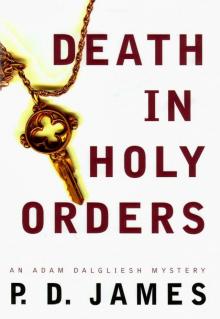 Death in Holy Orders
Death in Holy Orders The Victim
The Victim Shroud for a Nightingale
Shroud for a Nightingale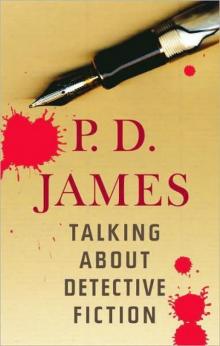 Talking about Detective Fiction
Talking about Detective Fiction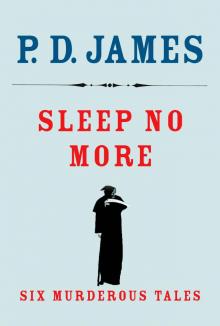 Sleep No More
Sleep No More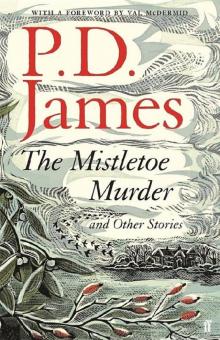 The Mistletoe Murder and Other Stories
The Mistletoe Murder and Other Stories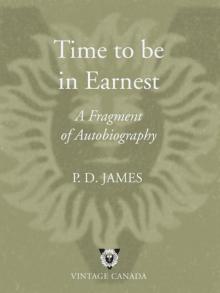 Time to Be in Earnest
Time to Be in Earnest Original Sin
Original Sin A Mind to Murder
A Mind to Murder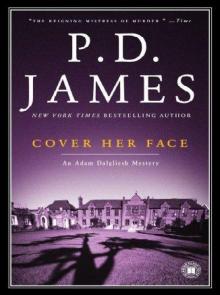 Cover Her Face
Cover Her Face Innocent Blood
Innocent Blood Devices and Desires
Devices and Desires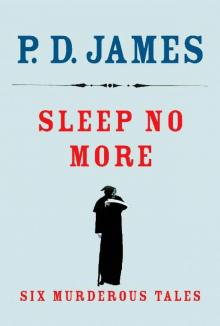 Sleep No More: Six Murderous Tales
Sleep No More: Six Murderous Tales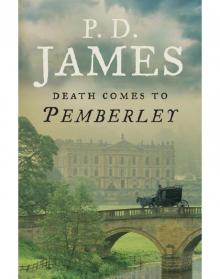 Death Comes to Pemberley
Death Comes to Pemberley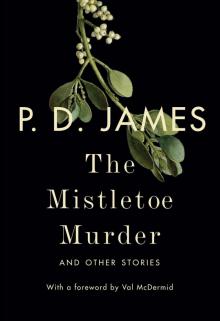 The Mistletoe Murder
The Mistletoe Murder Death of an Expert Witness
Death of an Expert Witness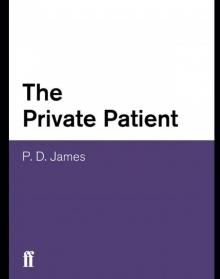 The Private Patient
The Private Patient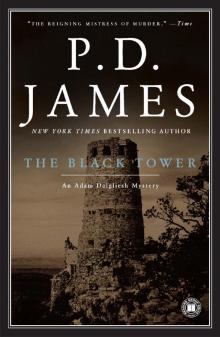 The Black Tower
The Black Tower Devices & Desires - Dalgleish 08
Devices & Desires - Dalgleish 08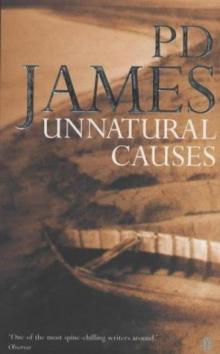 Unnatural Causes
Unnatural Causes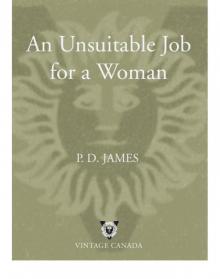 An Unsuitable Job for a Woman
An Unsuitable Job for a Woman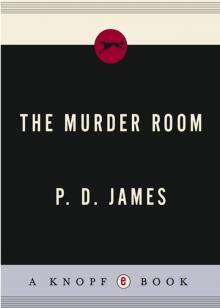 The Murder Room
The Murder Room A Certain Justice
A Certain Justice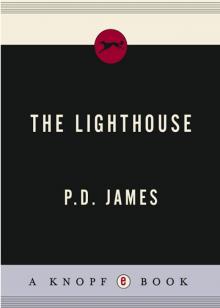 The Lighthouse
The Lighthouse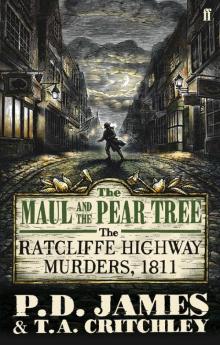 The Maul and the Pear Tree
The Maul and the Pear Tree